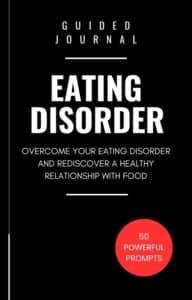Recovering from an eating disorder can be an arduous journey filled with countless ups and downs. It requires immense strength, resilience, and self-reflection. Journaling is a powerful tool that can aid in this process, allowing individuals to delve deep into their emotions, thoughts, and experiences.
By putting pen to paper, one can unlock hidden insights, confront fears, and cultivate a deeper understanding of oneself.
In this article, we present you with 50 thought-provoking journal prompts specifically designed to support those on the path to eating disorder recovery. These prompts will encourage introspection, foster self-compassion, and ignite personal growth.
So grab your journal and embark on this transformative exploration of self-discovery.
Understanding Eating Disorders: Navigating a Complex Relationship with Food and Body
Defining Eating Disorders
Eating disorders are serious mental health conditions characterized by unhealthy relationships with food, body image, and weight. They affect people of all genders, ages, and backgrounds and can have severe physical, emotional, and social consequences.
Types of Eating Disorders
- Anorexia Nervosa: Individuals with anorexia nervosa have a distorted body image and an intense fear of gaining weight. They often restrict their food intake, leading to extreme weight loss and malnutrition.
Example: Emma, a 17-year-old girl, constantly believes she is overweight despite being underweight. She restricts her food intake to a few hundred calories a day, leading to severe physical and emotional consequences.
- Bulimia Nervosa: Bulimia nervosa involves cycles of binge eating followed by compensatory behaviors such as self-induced vomiting, excessive exercise, or the misuse of laxatives. Individuals with bulimia often maintain a normal weight or may fluctuate in weight.
Example: John, a 25-year-old man, frequently consumes large amounts of food in a short period and feels a lack of control during these episodes. To compensate, he engages in excessive exercise and purging behavior.
- Binge-Eating Disorder (BED): BED is characterized by recurring episodes of consuming large quantities of food, often rapidly and to the point of discomfort. Unlike bulimia, individuals with BED do not engage in compensatory behaviors.
Example: Sarah, a 35-year-old woman, regularly experiences episodes of eating excessive amounts of food in response to stress or emotional triggers. She feels distressed and guilty afterward, but doesn’t engage in purging behaviors.
Causes and Risk Factors
Eating disorders are complex conditions influenced by a combination of genetic, environmental, psychological, and sociocultural factors. Some common risk factors include:
- Genetic predisposition and family history of eating disorders or other mental health conditions
- Societal pressure to conform to unrealistic beauty standards
- Traumatic life experiences, such as abuse or bullying
- Perfectionism and low self-esteem
- Co-occurring mental health conditions, such as anxiety or depression
Warning Signs and Symptoms
Recognizing the warning signs and symptoms of eating disorders is crucial for early intervention. Although each disorder has distinct features, some common indicators include:
- Drastic weight loss or fluctuations
- Obsession with body weight, shape, and appearance
- Preoccupation with food, calories, and dieting
- Avoidance of social events involving food
- Excessive exercise routines
- Changes in mood, including irritability, anxiety, or depression
Seeking Help and Treatment Options
Treating eating disorders requires a multidisciplinary approach involving medical, nutritional, and psychological interventions. Some treatment options include:
- Medical supervision and monitoring of physical health
- Nutritional counseling to establish healthy eating habits
- Psychotherapy, such as cognitive-behavioral therapy, to address underlying emotional and psychological issues
- Support groups and peer support networks for ongoing encouragement and guidance
- Medications, in some cases, to manage associated symptoms like depression or anxiety
The Importance of Support and Understanding
Recovery from an eating disorder can be a challenging and lengthy process. Support from loved ones, healthcare professionals, and a compassionate community plays a vital role in the healing journey. By fostering understanding, empathy, and promoting body positivity, we can create a more inclusive and supportive environment for those affected by eating disorders.
Remember, seeking help and support is crucial for recovery. If you or someone you know is struggling with an eating disorder, please reach out to a healthcare professional or a helpline dedicated to eating disorder support.
By coming together and dispelling the myths surrounding eating disorders, we can contribute to a healthier and more compassionate society.

The Transformative Power of Journaling in Eating Disorder Recovery: Unlocking Your Path to Healing
Welcome to a journey of self-discovery and healing through the transformative practice of journaling. In the realm of eating disorder recovery, journaling serves as a powerful tool to explore your thoughts, emotions, and experiences in a safe and nurturing way. By putting pen to paper, you open the door to introspection, self-reflection, and personal growth. In this chapter, we will delve into the definition of journaling and its profound benefits in your journey towards recovery.
Understanding Journaling
Defining Journaling:
Journaling is the practice of regularly writing down your thoughts, feelings, and experiences in a private and non-judgmental space. It involves the act of self-expression and introspection through written words. Journaling can take various forms, such as free writing, prompts, gratitude lists, or art journaling. The key is to find a method that resonates with you and encourages authentic expression.
Creating a Safe Space:
Your journal becomes a sanctuary where you can be your true self, free from external judgment. It provides a safe outlet to process your emotions, fears, and challenges associated with eating disorder recovery. In the pages of your journal, you can explore your thoughts and gain insights into the underlying causes and triggers of your disordered eating patterns.
The Transformative Benefits of Journaling in Eating Disorder Recovery
Self-Awareness and Reflection:
Journaling allows you to develop a deeper understanding of your emotions, thoughts, and behaviors. By regularly reflecting on your experiences, you become more attuned to your triggers, patterns, and underlying beliefs that contribute to your eating disorder. This heightened self-awareness empowers you to make conscious choices and take positive steps towards recovery.
Emotional Healing and Processing:
Through journaling, you give voice to your emotions and release them from within. By acknowledging and expressing your feelings, you can begin to heal emotional wounds that may have contributed to your disordered eating. Writing allows you to process complex emotions, such as guilt, shame, and anxiety, and provides an opportunity for self-compassion and forgiveness.
Identifying and Challenging Negative Thoughts:
Journaling helps you identify and challenge negative thoughts and beliefs that fuel your eating disorder. By examining these thoughts on paper, you gain objectivity and can develop alternative perspectives. This process allows you to reframe unhealthy beliefs and gradually replace them with positive and empowering ones.
Tracking Progress and Celebrating Victories:
Keeping a journal enables you to track your progress in eating disorder recovery. By recording your achievements, milestones, and moments of growth, you build a tangible reminder of your resilience and determination. Celebrating victories, no matter how small, boosts your self-esteem and motivates you to continue on your path to recovery.
How to Start Journaling for Eating Disorder Recovery
Set a Regular Writing Routine:
Commit to a regular writing routine that works for you. Whether it’s in the morning, before bed, or during quiet moments throughout the day, find a consistent time to engage in journaling. Consistency is key to reaping the full benefits of this transformative practice.
Choose a Journaling Method:
Experiment with different journaling methods to find one that resonates with you. Explore free writing, gratitude journaling, guided prompts, or art journaling. The key is to find a method that feels authentic and allows you to express yourself freely.
Create a Judgment-Free Zone:
As you journal, remember that there are no right or wrong answers. Embrace the process of self-discovery without judgment or criticism. Your journal is a sacred space for exploration and growth.
Seek Support and Professional Guidance:
While journaling can be a powerful tool for healing, it’s essential to complement it with professional support. Consider involving a therapist or counselor who specializes in eating disorder recovery. They can provide guidance, help you navigate challenging emotions, and offer insights that further enhance your journaling journey.
Embarking on the path of eating disorder recovery requires courage and self-compassion. Journaling serves as a steadfast companion, offering solace, clarity, and transformation along the way. By engaging in this practice, you open the door to self-awareness, emotional healing, and the reshaping of negative thought patterns.
Embrace the power of journaling and unlock the transformative potential within you. Begin today, and let your journal be a testament to your resilience, growth, and unwavering commitment to your own well-being.

Journal Writing Prompts for Eating Disorder Recovery
Describe how your relationship with food has evolved over the years. What events or experiences have shaped this evolution?
Write a letter to your body, expressing all the feelings you’ve been keeping inside.
Reflect on the first time you noticed disordered eating patterns. What were your thoughts and feelings at that moment?
If your eating disorder could speak, what would it say? What would you want to say back?
Imagine a day without any thoughts or worries about food or your body. What would that day look like?
How has your eating disorder affected your relationships with others? Write about an instance where it interfered with a relationship.
Describe three things you miss doing or enjoying because of your eating disorder.
Reflect on a moment when you felt trapped by your eating disorder. How did you cope?
Write a story about a time when your eating disorder tried to convince you of a lie.
Explore the feelings of guilt or shame that come with your eating disorder. How can you challenge these feelings?
Imagine you are advising a friend who confides in you about their struggle with an eating disorder. What would you tell them?
Describe the role media has played in shaping your understanding of body image and eating disorders.
Reflect on the most challenging aspect of your recovery journey. How have you overcome (or plan to overcome) this challenge?
What does self-love mean to you in your recovery journey?
Write about a time when you felt strong and in control in your recovery.
Explore your fears about letting go of your eating disorder. What might recovery look like for you?
How does your eating disorder affect your daily routines and habits? Describe a typical day.
Reflect on the coping mechanisms you’ve developed to deal with your eating disorder. Are they healthy or harmful?
Write a letter to your future self, who has overcome the eating disorder. What would you want to say?
Describe the emotions you feel when you think about food. How can you shift these emotions to a healthier perspective?
Explore the physical effects of your eating disorder. How has it affected your health and well-being?
Write about a time when you had to confront your eating disorder. What was the outcome?
Reflect on how society’s standards of beauty have influenced your perception of yourself.
Imagine your life after recovery from your eating disorder. What dreams and goals would you pursue?
Describe the support system you have (or wish you had) during your journey with an eating disorder.
Reflect on a moment of victory in your recovery journey. How did it make you feel?
What are the misconceptions people have about eating disorders? Write about a time when you had to address one.
Explore the reasons why you’ve held onto your eating disorder. What needs is it fulfilling?
Write a dialogue between you and your eating disorder. What would you discuss?
How has your eating disorder shaped your understanding of control and power?
Reflect on a time when you felt misunderstood because of your eating disorder.
What positive habits or coping strategies would you like to adopt in your recovery journey?
Describe a situation where your eating disorder made you feel isolated. How did you handle it?
Reflect on the impact of your eating disorder on your mental health.
Write a letter to someone who has been instrumental in your recovery journey so far.
Explore the concept of self-acceptance in the context of your eating disorder.
Reflect on how your eating disorder has changed your perspective on life.
Describe the thoughts that race through your mind during a meal. How can you work towards changing them?
What steps can you take to improve your relationship with food?
Reflect on a moment when you felt overwhelmed by your eating disorder. How did you get through it?
Write about a time when your eating disorder felt like a safety blanket. What was happening in your life at that time?
How do you envision your relationship with food in the future?
Reflect on a time when your eating disorder made you behave differently than you normally would.
Explore your triggers related to your eating disorder. How can you manage them better?
Write about a moment when you felt in control of your eating disorder.
Reflect on the role of therapy in your recovery journey.
What are the lessons you’ve learned from your experience with an eating disorder?
Describe how your eating disorder has impacted your career or schooling.
Reflect on a moment when you wished people understood the reality of living with an eating disorder.
Write a goodbye letter to your eating disorder, describing how you plan to move forward without it.
Download Printable Journal Prompts (PDF) >>
Guided Journal for Eating Disorder Recovery
50 Profound Writing Prompts to Overcome Your Eating Disorder and Rediscover a Healthy Relationship with Food

Welcome to the Guided Journal for Eating Disorder Recovery, a comprehensive and empowering resource designed to support individuals on their path to healing from the grips of an eating disorder. This journal is more than just a book; it is a trusted companion that will accompany you every step of the way, providing guidance, encouragement, and a safe space for self-reflection. Whether you are just starting your recovery journey or seeking additional support, this journal is here to help you navigate the challenges, overcome obstacles, and embrace a life of freedom and self-acceptance.
The Guided Journal for Eating Disorder Recovery is more than just a book; it is a beacon of hope, guiding you towards a life of freedom, self-discovery, and lasting recovery. By using this journal as your trusted companion, you will develop the tools, insights, and resilience necessary to overcome the challenges of your eating disorder and embrace a healthier relationship with food and self. Let this journal be your sanctuary, a place where you can safely explore your emotions, track your progress, and celebrate the victories along your journey. Start your transformation today and reclaim your life from the clutches of an eating disorder.
As you close your journal and reflect on the journey of eating disorder recovery, remember that self-acceptance and self-love are ongoing processes. The road may be long and challenging, but by consistently engaging in self-reflection and utilizing tools like journaling, you are actively paving the way for healing and growth.
Embrace the moments of vulnerability, celebrate your victories, and honor yourself for the progress you’ve made. And as you continue on this path, always remember to be kind to yourself.
Take a moment to consider the question: “How can I continue to support and nurture myself on this journey of recovery?”
This inquiry will serve as a guiding light, reminding you to prioritize your well-being and remain committed to your own growth and healing.

